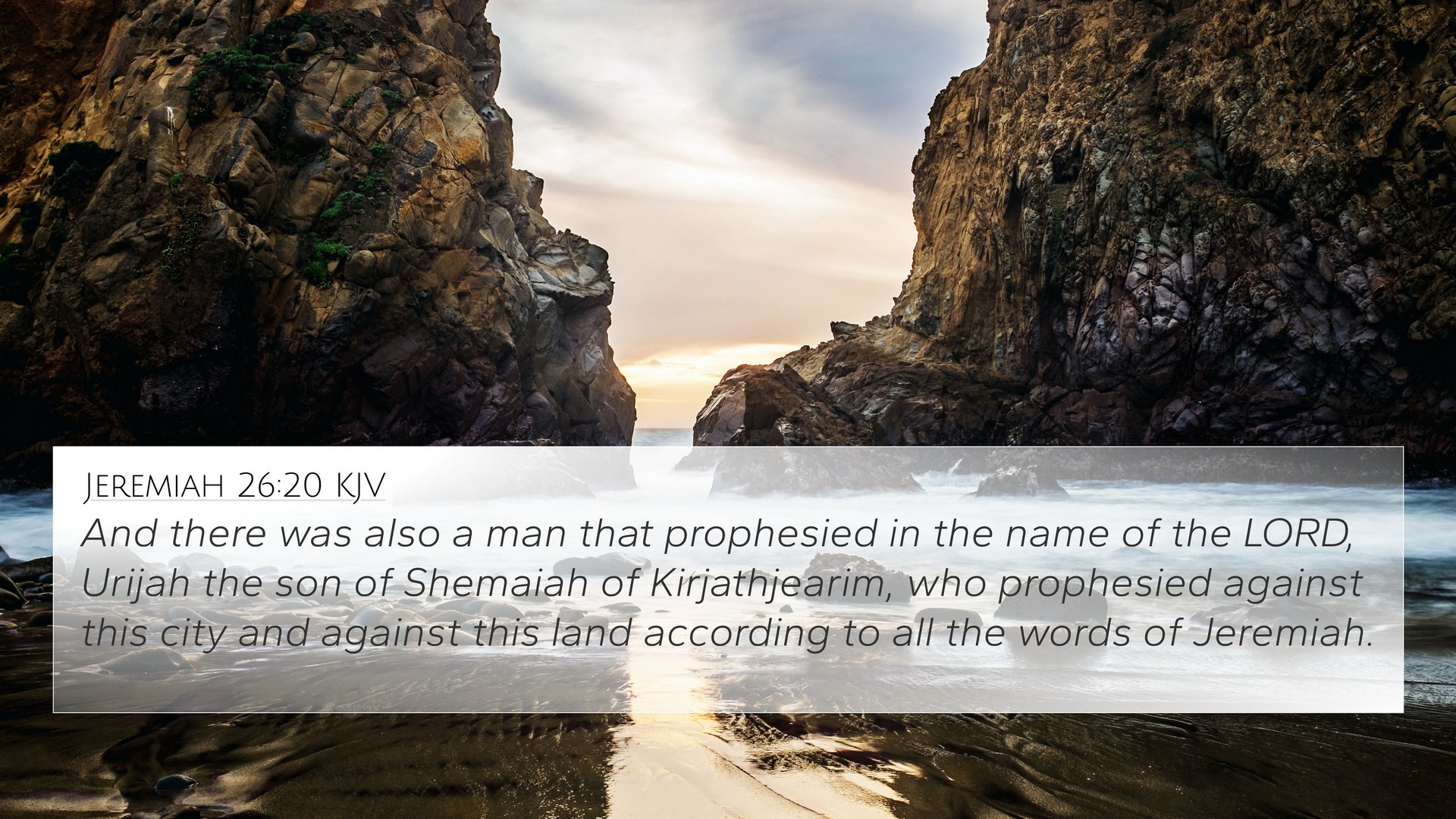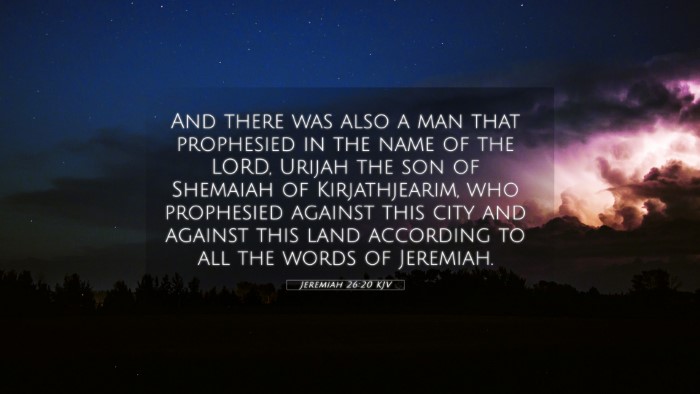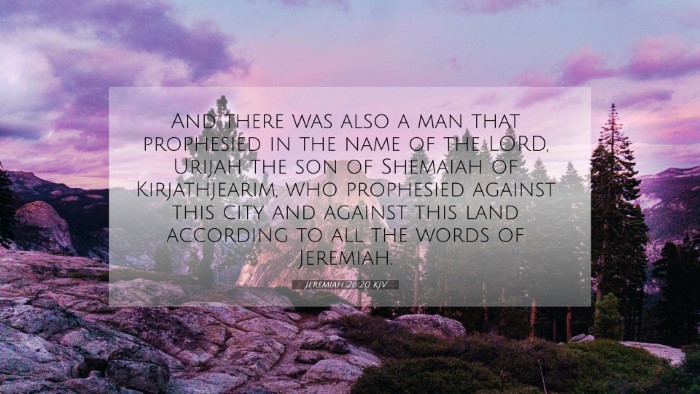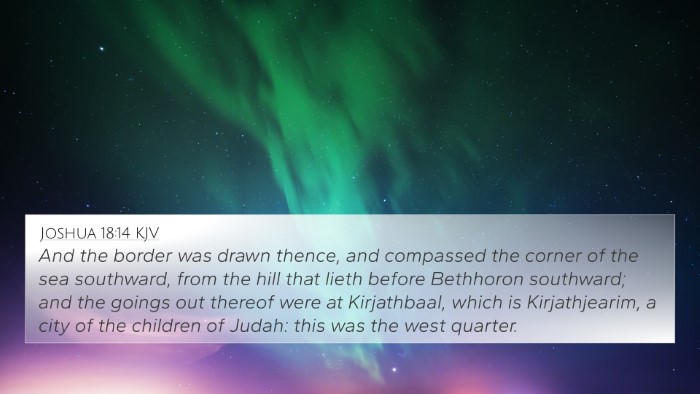Bible Verse Meaning: Jeremiah 26:20
Verse: "And there was also a man that prophesied in the name of the Lord, Uriah the son of Shemaiah of Kirjathjearim: and he prophesied against this city and against this land according to all the words of Jeremiah." (Jeremiah 26:20)
Summary of Jeremiah 26:20
The verse introduces Uriah, a prophet who, like Jeremiah, boldly proclaimed God’s message against Jerusalem and the surrounding land. His actions parallel those of Jeremiah, illustrating the dangers faced by true prophets in times of spiritual decline.
Insights from Commentaries
Matthew Henry's Commentary
Henry emphasizes the courage required to stand against the prevailing culture. He notes that Uriah's prophetic ministry serves as a testament to God's continual communication with His people, despite the risk of persecution. Uriah's prophesying aligns with God’s intentions, echoing Jeremiah’s warnings. Henry highlights the significance of God’s messengers being cast out for their divine truths, suggesting a broader theme of prophetic rejection and authenticity in biblical testimony.
Albert Barnes' Notes
Barnes points out that Uriah’s message mirrored that of Jeremiah, showing a firm stand against idolatry and immorality prevalent during that period. He notes that Uriah’s fate—hunted down and killed—represents the dire consequences of proclaiming God’s truth in an unrepentant society. Barnes’ analysis focuses on the vulnerability of true prophets and illustrates the conflict between God's will and human authority.
Adam Clarke's Commentary
Clarke elaborates on the geographical context of Uriah’s origins, indicating that he came from a place associated with notable biblical events. He interprets the boldness of Uriah’s prophecy as critical in a time when the majority turned away from God. In discussing Uriah’s demise, Clarke offers a somber reflection on the price of faithfulness in prophecy, reiterating the theme of persecution faced by the righteous throughout the scriptures.
Thematic Connections
This verse underscores themes of prophetic witness, rejection, and the constancy of God’s messages throughout history. It allows for exploring the relational dynamics between God’s prophets and societal resistance. The following Bible cross-references are relevant:
- Jeremiah 1:17 - The call to be unafraid in proclaiming God’s words.
- Jeremiah 20:3 - The personal consequence of being a prophet, illustrated through Jeremiah’s own experiences.
- Micah 2:6-7 - The issue of false prophecies and a reminder of the true prophetic voice.
- Matthew 5:12 - Jesus’ affirmation of the blessing upon those persecuted for righteousness’ sake.
- Acts 7:52 - Reference to how prophets were met with hostility by the people, akin to Uriah’s experiences.
- Hebrews 11:37 - Recognizes the suffering endured by prophets, applicable to Uriah’s story.
- 2 Chronicles 36:16 - Contextualizes rejection toward God’s messengers throughout Israel's history.
Cross-Referencing Biblical Texts
This verse provides a lens through which to cross-reference the prophetic messages across the Old and New Testaments, demonstrating a continual thread of divine communication. Several methods can assist in Bible cross-referencing:
- Use of a Bible concordance to find related themes and messages systematically.
- Bible cross-reference guides offer structured connections between similar verses.
- Comprehensive materials detail linking subjects and principles across texts, enhancing thematic studies.
Conclusion
Jeremiah 26:20 serves as a significant reminder of the resolve necessary for those who stand for truth amidst opposition. The shared destinies of Uriah and Jeremiah emphasize the persistent message of God to His people, calling for repentance and faithfulness. By exploring this verse through the insights of esteemed commentators and connections to other scriptures, a deeper understanding of God’s unwavering purpose can be attained. For those delving into the rich connections within the Bible, this verse offers a vital starting point for further exploration and comparative Bible verse analysis.







